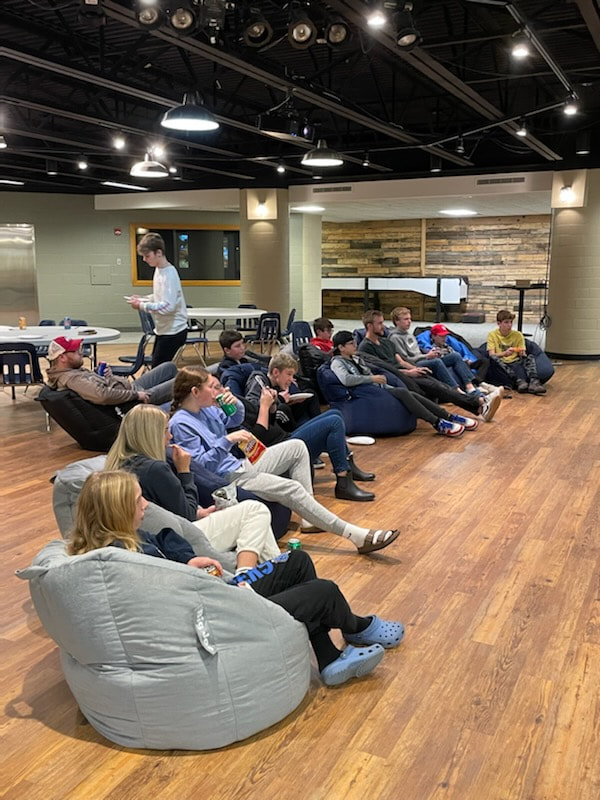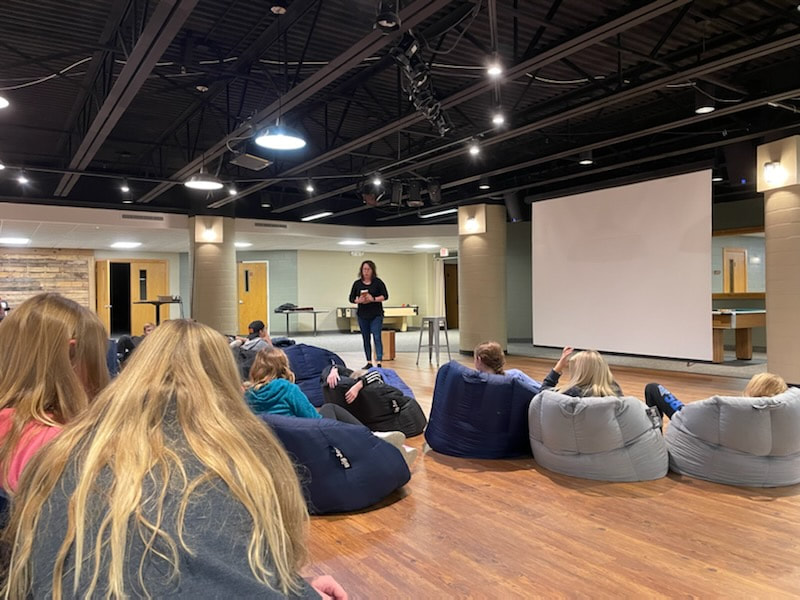|
Hey Parents!
This past Sunday at youth group we were blessed by the Ritsema family with some excellent food, had some laughs, prayed for snow days, and learned how to be a good friend to those in need by looking at Elijah! The third week of our “being with” series took us back to 1 Kings 18, where we read about Elijah and the widow. At first glance, some of our students thought that Elijah was a bit of a jerk for asking a woman for food in the midst of a drought. Especially considering that she was gathering sticks to go home and cook the last little bit of food that she had for herself and her son, Elijah’s request seemed a bit tone deaf. As we kept reading and students saw that Elijah was being used by God to provide for this woman, it started to click for them. Not only did Elijah ask for some food, he also stayed with the woman and got to know her before moving on. After digging into the Bible I asked if any students knew someone who might be “in need.” It’s easy to take our basic needs for granted when they’re met, especially when most people around us are in the same boat. Most students couldn't think of anyone they knew who might not know where their next meal was coming from, or didn’t have a house, but admitted that those people certainly existed around them. We face an even greater challenge in West Michigan where asking for help is still stigmatized, so finding ways to help people in need when they don’t want to ask for help in the first place requires us to seek those people out. We spent some time in debrief groups talking about how to help people while maintaining their dignity (not with those words exactly :) and how we can be thankful for the way God has provided for us. Next week there is no youth group, because we get to meet instead! The following week we will be wrapping up our series on being a good friend to those who need hope! Thanks for stopping by!
0 Comments
Happy Monday!
Last night we ate pancakes, played some board games and Mario Kart, Eli led us in worship, and Julie Amshey taught us how to be a good friend to those who are lonely! Last week in youth group we discovered some giant bags of pancake mix in the youth snack closet, and this week we put those to good use! Unsurprisingly, chocolate chip pancakes were a hit. After some quality time laughing and playing together, Eli led us in worship, I led some prayer, and Julie continued our series on being a good friend to those who are struggling by reflecting on the story of Ruth and Naomi! I was sick last week and steadily losing my voice, so Julie saved my life and offered to teach our large group! She took the time to tell a more modernized version of the story of Ruth and how Ruth stuck by Naomi even when she was lonely and pushing Ruth away. After a famine forced Naomi and her family to move from Bethlehem to Moab, her husband dies and her two sons get married to some Moabite women - Ruth and Orpah. Tragically, Naomi’s two sons also die and the three women are left to fend for themselves. Lonely doesn’t even being to describe how they must have felt! Naomi decides that there is nothing left for her in Moab, and tries to send her daughters in law back to their mothers. After much weeping Orpah returns to her family, but Ruth tells Naomi that she isn't going anywhere. Naomi tries to reason with her, saying that there will be no men for her to marry! If your students came home and told you that “Ruth wouldn’t marry a cow,” this is the context. 😀 Ruth refuses to leave Naomi in her loneliness though, and says “wherever you go, I will go. Wherever you stay, I will stay,” and the women set off to Bethlehem. To make a very long story short, Julie explained that God provided for Ruth and Naomi, even in their loneliness, and Ruth eventually met Boaz. Many generations later, a pretty important descendant of Ruth had some letters written about him. That descendant was Jesus, and one of those letters was 1 John. She explained that in that letter, Christians are told that they have the Holy Spirit, and are never truly alone. Beyond that, we were made for community and are called to be there for each other - especially when we are lonely. We broke out into our debrief groups, and talked about some of the practical ways we can show love to lonely people, especially at school. My group seemed to think that loneliness could be cured by laughter or distraction, so we dove a little deeper into how to actually address the root problem of loneliness. Reaching for youtube or minecraft can temporarily feel helpful, but authentic connections with other people who love Jesus are some of the best medicine for loneliness. Next week, we are continuing this series by talking about how to be a good friend to those in need! As always, thanks for checking in and feel free to reach out with any feedback you might have! Have a wonderful week! Last night in Middle school we kicked off the night with some board games, hang out time, and our usual assorted snacks. I was reminded again how the shared experience of middle school is defined by Fortnite, and laughed with some of our ladies playing “what do you meme.”
Before jumping into our lesson we took prayer requests and spent some time praying for parents who were traveling and for a good week :) The new series we are in should carry us through the end of the year, and focuses on being a good friend to those who are struggling. We kicked off by talking about strong emotions and how being a friend when someone is experiencing “big sad” (as the students put it,) is hard. I asked if anyone was willing to share about the most sadness they had ever felt and, as expected, all the answers revolved around the loss of a family member or pet. Grief is incredibly complex, even for adults, so we talked about some of the things that helped and didn’t help those students in the midst of their grief. Sometimes people with good intentions say things that don’t really help a grieving friend like “God needed an angel!” or “Everything happens for a reason!” or “I know exactly how you feel.” Those things may come from a place of care or compassion, but they often don’t do anything to meaningfully help a person who is grieving. In order to learn how to actually help, we cracked open the book of Job. Job had it all - he was wealthy, happy, healthy, and blessed with a large family, many animals, and a lot of land. As you probably know, it doesn't stay that way, though. Job loses his animals to thieves and death, his children to a natural disaster, and his wife tells him to “give up, curse God, and die.” In the midst of all the grief he was feeling, his friends came and in chapter 2 we read about how they cared for him. Job’s friends worked together to comfort him, sympathized with him, showed up for him, and empathized with him. We talked about the difference between sympathy and empathy and how Eliphaz, Bildad, and Zophar went beyond feeling bad for Job, and they entered into his sadness with him by tearing their robes and pouring dust on their heads. They proceed to sit in silence with Job for a whole week because they knew that there were no words to help their friend, and they offered simple presence instead. While it might not be helpful or practical for us to tear our robes and pour dust on our heads in today's culture, the gift of a listening presence for our friends who are grieving certainly is. As we moved into debrief groups we made it a bit more practical and brainstormed ways that we could offer that kind of help. Something like a text or a call to let your friend know you are thinking about them and willing to listen is powerful, and remembering to be patient and have grace for people as they grieve is important. We will continue this series next week by talking about how to help those who are struggling with loneliness! One final reminder that this upcoming Saturday is our Walk Thru the Bible event! We would love to see you there! Thanks for checking in and have a wonderful rest of your week! |
AuthorI'm Noah! I like Jesus. Archives
November 2023
Categories |



 RSS Feed
RSS Feed

